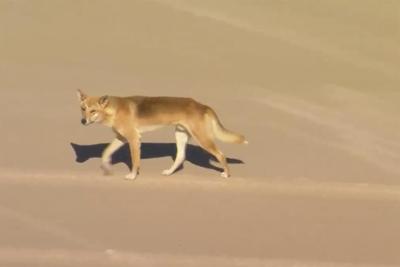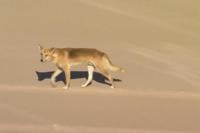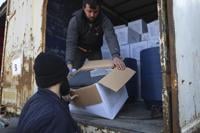CANBERRA, Australia (AP) — Wildlife authorities have killed the leader of a pack of dingoes that mauled a jogger on a popular Australian tourist island in a ferocious attack that a rescuer said could have been fatal.
Sarah Peet, 23, was attacked by three or four Australian native dogs on Monday as she jogged along a beach at Queensland state’s K’gari, the world’s largest sand island formerly known as Fraser Island.
The Brisbane resident was flown by helicopter to a mainland hospital in a stable condition. The health department refused to provide an update on her condition Thursday, citing patient confidentiality.
Wildlife rangers captured and humanely euthanized the leader of the pack on Wednesday, the Queensland Parks and Wildlife Service said.
“Euthanizing a high-risk dingo is always a last resort and the tough decision by the Queensland Parks and Wildlife Service was supported by the island’s traditional owners, the Butchulla people,” a service statement said.
The dingo was the second on the island in recent weeks to be killed for biting and threatening behavior. Authorities blame dingoes' increasing fearlessness on tourists who ignore rules by feeding them or encouraging them to approach in order to post social media images.
Wary young dingoes avoided humans when pandemic travel restrictions were first eased in late 2021. But their dangerous human interactions are increasing with tourists’ encouragement as visitor numbers rise.
Peet did not deliberately encourage dingoes to approach her. But visitors to the World Heritage-listed Great Sandy ��ɫֱ�� Park are warned against running or jogging outside fenced areas because of the risk that dingoes will chase them.
The dingoes forced Peet into the surf, deploying the same hunting strategy that rangers say they use against large prey such as kangaroos and wallabies.
Tourists Shane and Sarah Moffat were driving along the beach in their SUV when they saw Peet being attacked.
“We’ve seen two dingoes hanging off the side of her,” Shane Moffat told Nine News television.
“She was walking towards me with a hand up yelling out, ‘Help, help,’” Moffat said. “I could see fear in her face, that she wasn’t in a good way.”
Moffat said he ran to Peet, forcing himself between her and the pack leader. Moffat bloodied his fingers on the dingo’s fangs as he punched it.
Moffat said Peet’s injuries included a chunk of flesh missing from her right upper-arm and bite marks to her legs.
He doubted she would have survived if he had arrived at the scene any later.
Wildlife rangers agreed that Peet would have died without the Moffats' help.
“We believe the people who intervened saved her life that day,” principal ranger Danielle Mansfield said.
The pack leader was one of three dingoes on the island fitted with tracking collars because of their high-risk behavior.
When he was collared in April, he was around 2-year-old and weighed 17 kilograms (37 pounds) which was heavy for a dingo and indicated he had been fed by humans, authorities said.
The dingo killed by authorities in June after separate attacks on a 7-year-old boy a 42-year-old French woman was the first to be destroyed on the island since 2019.
Rangers said that dingo was the offspring of a collared mother that had taught her pups their dangerous ways.
K’gari is home to some of Australia’s purest dingoes because domestic dogs have long been banned. Dingoes are a protected species and authorities are considering how they can more safely coexist with humans on the island.
Tourists who breach wildlife rules on K'gari to take selfies with dingoes have been warned that the Queensland Parks and Wildlife Service monitors social media to impose fines that can be as high as 12,000 Australian dollars ($8,191).
Two tourists had recently been each fined AU$2,300 ($1,569) for getting too close to dingoes to “get selfies and videos,” Environment Minister Leanne Linard said after visiting the island in response to the attack.
The women, aged 29 and 25, were only caught because they posted the images on social media.
One woman had videoed three sleeping dingo pups.
“I’m sure they were very cute, but there would have been a mother nearby and any mother will defend their child and their babies really voraciously,” Linard told Australian Broadcasting Corp.








































